坂根宏治氏は、「人道と開発の連携」に「平和」を含めた、「三者の連携(Triple Nexus)」の現状と課題、および「持続的な平和」の実現に向けた課題について講演を行った。
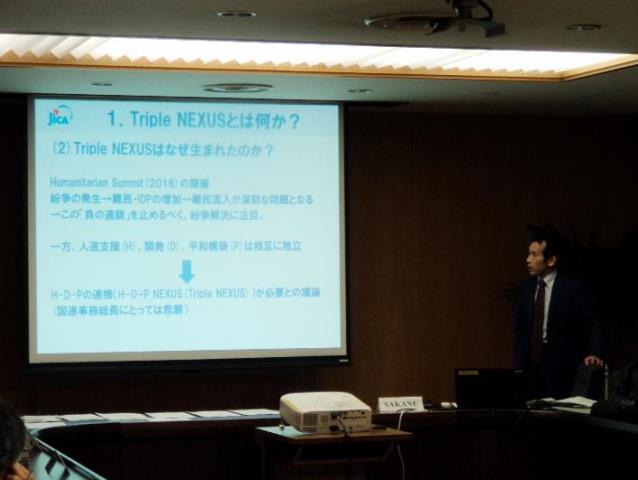
日本国際平和構築協会は2019年3月30日、JICA市ヶ谷 地球ひろばで第44回研究会セミナーを開催。坂根宏治JICA平和構築・復興支援室長が「Triple NexusとSustaining Peace」についてプレゼンテーションを行い、参加者が自由討論を行った。「Triple Nexus」は「人道(Humanitarian(H))―開発(Development(D))―平和(Peace(P))の連携」のことであり、「持続的な平和(Sustaining Peace)」の実現のために必要なものと理解されている。坂根室長の講演概要は以下の通り。
「Triple Nexus」は、大規模な難民流入が難民受け入れ国の負担となる現状を踏まえ、2016年に世界人道サミットが開催され、従来から議論されてきた「人道と開発のNexus」に加え、「平和」活動についても連携する必要性があるとの議論が国連等を中心になされる中で浮上したテーマである。これは、紛争やそれにより発生した難民・国内避難民の問題等、現在、国際社会が抱えている諸問題に国際社会が有効に対応できていないとの問題意識の下、このような現代の諸題への対処の方法として提起されたものである。
国際社会は2016年以降、Triple Nexusの実現に向け、様々な取り組みを行ってきた。その結果、人道、開発、平和活動相互の連携が図られ、現場における平和構築に変化が生まれている。JICAにおいても、例えば北部ウガンダにおいて難民受入国における人道と開発のNexus促進のために、難民及びホストコミュニティ双方の情報を統合したデータを作成し、関係者間で共有する等の取り組みを行っている。しかしながら、人道、開発、平和の取り組みはアクターやその目的が異なるため、連携にはおのずと限界がある。特に「人道と開発のNexus」という古くて新しいテーマについては、紛争当事者へのアプローチ、とりわけ外部介入者の中立性担保の点で、人道と開発のアクター間でスタンスが異なるため、人道関係者からは、人道と開発の連携は「人道の原則」を侵害するもので、「連携を好まない」との意見が表明されることもある。Triple Nexusについては、連携が先にありきではなく、国際社会がいかにして現代の諸課題に対応すべきかを考える視座が必要である。
「持続的な平和」の実現を考えるにあたっては、現在の国際社会の「危機」が大きく変容していることを認識する必要がある。国際社会の秩序は二極体制から一極体制を経て、現在は多極化・無極化の時代を迎えている。また「危機」の内容については、国家間の紛争から、テロとの戦いに変わり、さらに現在はマフィア等による暴力や、国家による暴力、極右テロなどが問題となっている。このような新しい「危機」に対応するには、「危機」の背景にある格差、疎外等の課題を認識し、これらの課題の解消を図るべく、「法の支配」の確保、「疎外された人のいない(No one left behind)」多様な社会の実現が必要である。
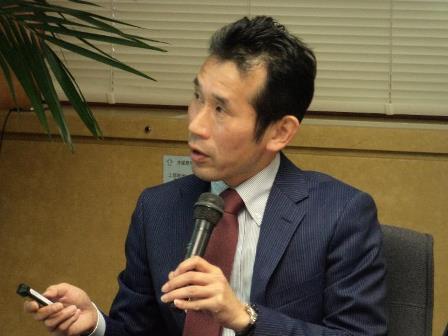
坂根室長プレゼンの後に自由討論が行われた。初めに発言された上智大学の東大作教授は、2月中旬から、外務大臣の委嘱による公務派遣で、イラク、トルコ、エチオピア、南スーダンでそれぞれ講演をしながら調査を行った経験を共有しつつ、南スーダン等での調査について、坂根室長から協力を得ていることについて謝意を述べた。
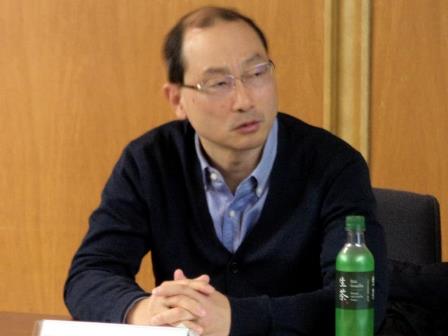
その上で、3月中旬にワシントンDCとニューヨークに、上の調査の発表と国連幹部へのインタビューを実施するために出張をして、国連改革によって1月に新たに設立された、DPPA (Department of Political and Peacebuilding Affairs)と、DPO(Department of Peace Operations)についての所見を述べた。東教授が面会した複数のASGや部長のうち、地域を担当している人たちは、DPPAとDPOの双方を兼務しており、実態的にはDPPAとDPOが融合する形で業務が行われているようだと報告した。東教授は、また坂根室長の報告にあったH(人道支援)とD(開発)を直接つなげる前に、まずP(平和構築)の定着が必要であり、まだ紛争が続いている際に開発を行うことは、資金が軍事目的に流用され、援助機関側のモニターができないなどのリスクがあると指摘、そのあたりをJICAとしてどう考えているのか質問をした。
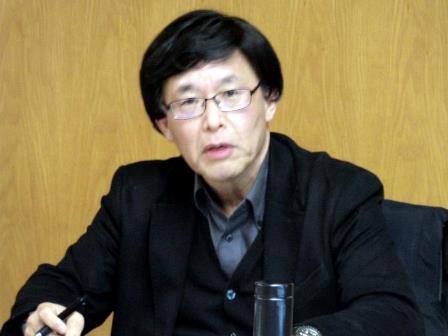
黒澤啓教授が 二点を示唆しました。一つ目は紛争の原因として、不平等、疎外、不正義の3つが挙げられているが、そのうちの不平等に関しては、JICAはどのような支援をしているのか。二つ目はH-D NEXUSに関して、もともと30年以上前に人道と開発の連携の必要性が言われるようになったのは、大量の難民を受入れている地域の負担を軽減するために開発援助を実施すべきという観点からであり、この問題は未だに国際社会の課題となっている。紛争終結後の人道と開発の連携だけでなく、この問題にも焦点をあてるべきである。
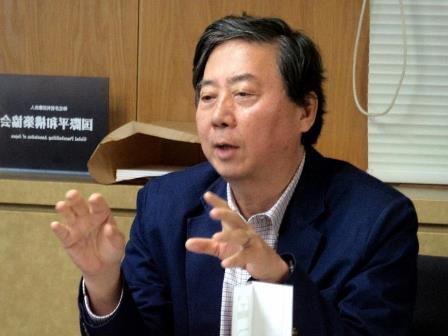
JICAの井上健シニアアドバイザーは、平和・人道・開発はある程度の連携は必要だが、三つの活動がそれぞれのよって立っている原則や目的は異なっているので、トリプルネクサスがめざすようにすべてをリンクさせるのは困難だし必要もないのではないかとコメントした。例えば、人道支援における活動の独立原則は、平和維持活動の軍事活動や開発における政府との協議と折り合いをつけることが難しい。また開発協力では、効果・効率・時間のどれもがバランスよく考慮されるが、人道支援では時間と効果が最重要であり効率はあまり重視されない。平和活動では効果が最重要で効率や時間はあまり考慮されていない。結局、平和・人道・開発は結びつき(Nexus)というよりもこれまでどおりの並行しながらも連続性(Continuum)を持つというやり方のほうが効果的なのではないか。また、JICAは平和活動も紛争地域における人道支援活動も行っていないが、このトリプルネクサスはJICAにとってどのような意味があるのかと質問した。
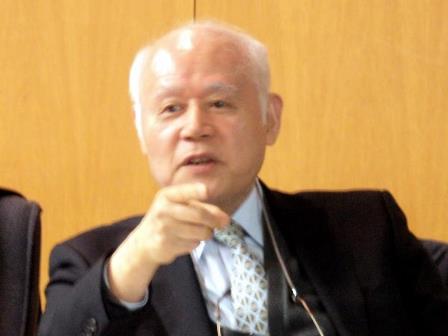
その後の二回目のコメントと質問のセッションで、初めに猪又忠徳大使が最近の紛争や災害の復旧・復興過程が極めて長期化する中で、これに人道(H)―開発(D)―平和(P)の諸段階のnexus をもって対応するのは、大切であるが、その実現のフォーミュラはない。むしろ、個々の事例に即して、当該紛争や災害の根本原因除去に、コミュニテイーレベルで”No one be left behind”がどのように貫徹され、それが復興のnexus促進にどのような紐帯的役割を果たしているかに注目するべきであると述べた。復興の長期化へのnexusによる対応は、途上国のみならずわが国にも妥当する。例えば、東日本大震災からの復興の長期化の原因は、住民の放射線への恐怖に行政が適切に向き合ってこなかったことである。いまだに8万人に及ぶ福島原発事故からの避難者の帰還と地域のlivelihoodの回復は、”No one be left behind” を基礎として住民に寄り添うTriple Nexusの強化に依存しているのではないかと質問をした。
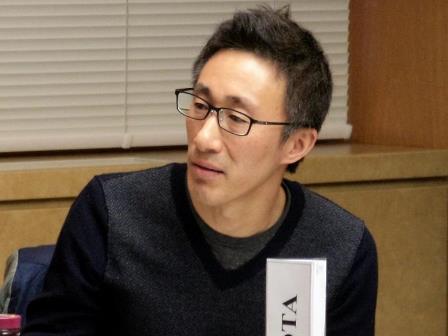
猪又大使の後に、窪田悠一教授は政府のLegitimacyに対しては、市民が紛争後にどのような公共サービスを政府から受けたかよりも、紛争中に反政府武装勢力を含めた政治アクターから受けたサービスの影響が大きいように思われると述べた。そして開発セクターは政府のコントロールが及ばない地域には支援を行わないとのことであるが、JICAを含めた開発機関・関係者はこの点をどのように考えているのかと質問された。
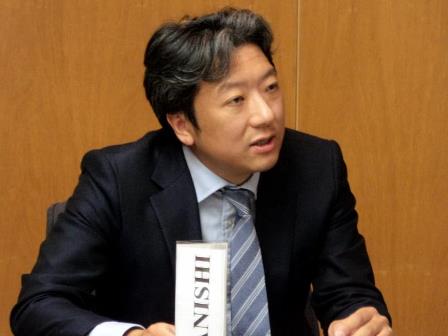
中西氏は、1点目として、人道と開発のリンクをより深く考察する必要性を指摘した。そして、2点目として、「法による支配」ではなく「法の支配」の重要性についてコメントした。人道(H)-開発(D)-平和(P)の連携に際して、PとDの連携は事例をあげることが難しくとも、HとDの連携についてはすでに多くの事例があると考えます。その事例を整理し分類し類型を作っていただければ、そこから改めて、PとDの連携が討議できるのではないかと考えます。それぞれ確かに理念から差異があり、そこから形成される制度的な背景に差異があることは理解されますが、理念から重なり合う部分もあることまた同様に理解されるものです。その重なり合う部分における連携を討議し、制度を形成するために、HとDの連携について、既存の事例を整理していただけましたら幸いです。第2点目として、結論部における「法による支配」とされている文脈は、「法の支配」とされるものと考えます。前者とするとその文脈上意味が全く違ってしまうものであるため、2つのコンセプトの意味を検討していただければ幸いです。
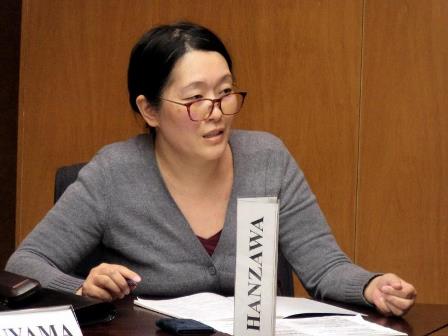
ICRC駐日代表部顧問の榛澤(はんざわ)祥子女史はICRCは人道支援を実施する団体ではあるが、坂根氏が指摘された公正な「法の支配」を確立する社会の実現という同じ目標に向かって歩んでいる組織でもあると指摘した。国際人道法(IHL)の守護者であるICRCが求める人道法の遵守は、均衡性の原則などに鑑みれば復興・開発に結びつくものであり、紛争に関わる全当事者との対話といったものは、preventionの要素を含むものです。即ち、ICRCの活動は人道支援の枠に捕らわれないものでもあると言えるかと思います。質問としては、H-Dの観点からJICAとしてどのタイミングでシリア復興に関与するのでしょうか。
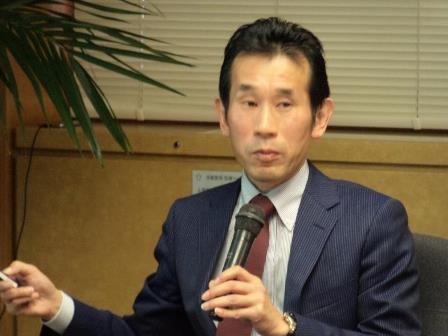
参加者より出された質問に応じて、坂根室長は以下のように回答した。
- 人道と開発が行われる前に平和事業が行われることは望ましいものの、実態としては紛争終結後、紛争が再発するなど、人道、開発、平和の3つのオペレーションは同時並行で進行することが多くなっている。
- 「不平等」の解消には、相続税の導入・強化等により格差の世代間継承を解消するなどの取り組みがあるが、JICAとしてかかる分野にどの程度実施しているか、詳細は承知していない。
- JICAにおけるTriple Nexusの実践に関しては、世銀の平和構築の取り組みと同様、開発事業の範囲で、平和構築を促進する事業に取り組んでいる。これは、JICAが、制度上、PKO等の軍事的枠組みや和平交渉等の政治的枠組みを行うことが認められておらず、また紛争に対する人道支援の実施が認められていないことによる。
- 難民受入国における負担軽減に関して、JICAではウガンダの他、ザンビアやパレスチナ等でも支援を行っている。
- 「平和活動(P)と開発(D)間のNexus」に関しては、例えば警察官の能力強化や武装解除・動員解除・社会統合(DDR)への支援等を行っている。
- 日本の経験の対外発信に関して、JICAでは例えば、紛争影響国の関係者を日本に招聘し、広島や東日本の復興プロセスを理解していただく取り組みを行っているが、日本の経験が紛争影響国の役に立つ部分は大いにあると実感している。
- 紛争国で政府のコントロールが及ばない地域での開発支援に関して、JICAはODA事業として政府間協力(G to G)を行っており、相手国の主権尊重が前提である。なお、外部からの介入に関しては、外部アクターはあくまで部外者であり、当事国のオーナーシップが持続性確保のために重要と認識している。
- 「人道と開発の連携」事例は、多くあるが、今日は時間の都合上、割愛した。
- 「法による支配」(rule by law)ではなく「法の支配」(rule of law)ではないかとの点は、ご指摘の通り誤記である。
- シリアに関しては、シリア難民を受け入れているヨルダン等の周辺国において、難民受け入れコミュニティ支援等を行っている。シリア復興そのものは、これからどのようなスタンスで支援を行うべきか、今まさに検討中である。
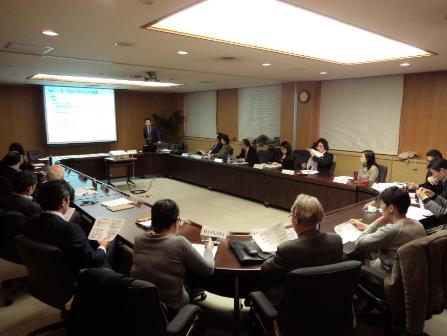
最後に長谷川さんが結びの言葉で三つの点を示唆した。第一点として、人道支援活動から開発援助へ移行する前に社会の回復あるいは復旧(recovery)を成し遂げる必要があることである. 1998年にTICAD IIに参加するために東京を訪問していた当時のUNDP総裁のマーク・マロック・ブラウン(Mark Malloch Brown)氏と話し会ったことに言及し、それ以後20年間にわたり、この課題が国際社会でより包括的に取り組まれていることは意義があると述べた。第2点としては、社会において取り残されているマイノリティーに関して、日本は単一民族国家であり、日本で住む外国人が疎外されないような包摂的な社会 構築支援をすることをJICAの新しい職務とすることが望まれるとの見解を述べた。第3点として、人間の安全保障の目的として貧困と恐怖からの二つの「自由」の必要性が指摘されたが、イマヌエル・カント(Immanuel Kant)が説いているごとく、「恒久の平和」を達成する為には、より重要なことは第3の「自由」を確保することであると述べた。すなわち、国や地域社会の指導者が人間として抱いている権力や富への貪欲さから解放され自由になることで、社会の安定と平和に貢献することが出来るのである。このような観点から、日本は紛争多発国や強権主義国家の指導者に働きかける特使の派遣などに行うべきであると述べた。




